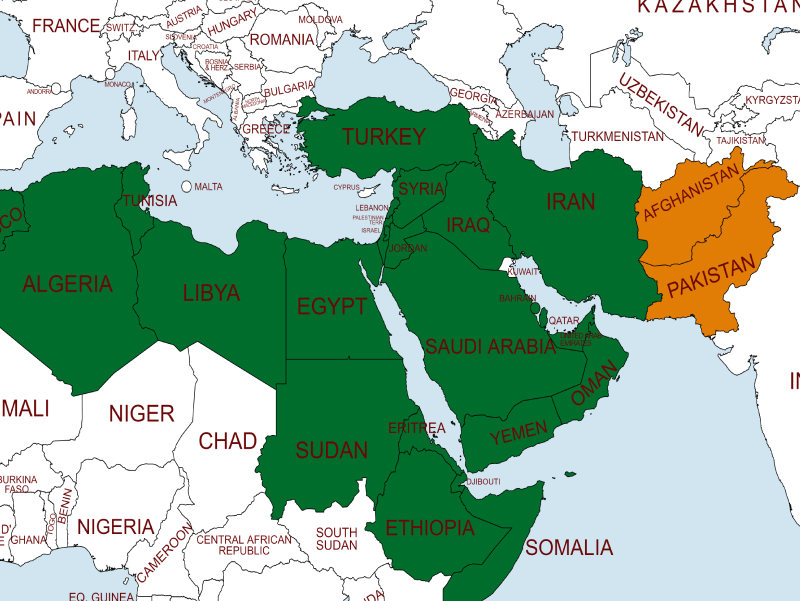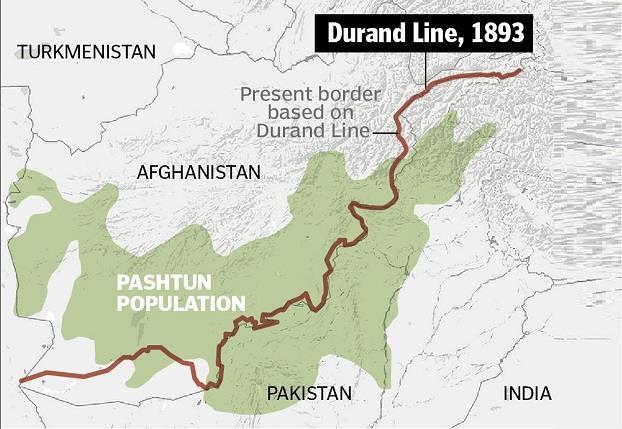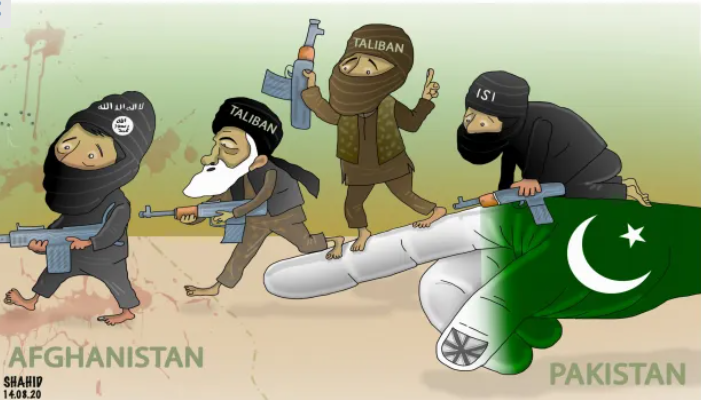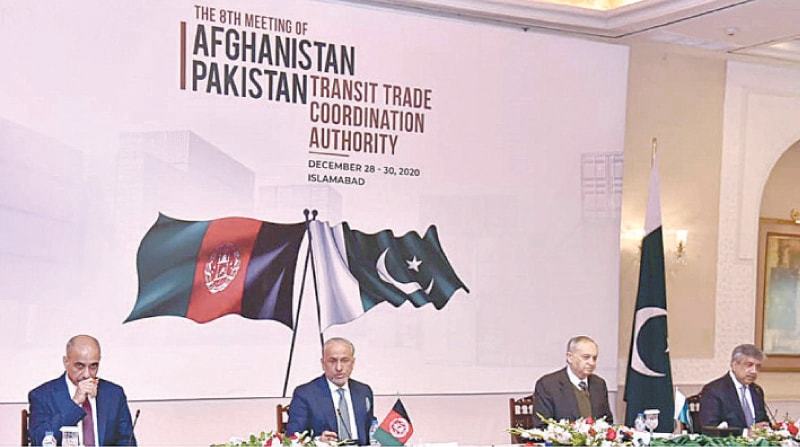
MENA is an acronym that refers to the countries of the Middle East and North Africa, from Pakistan and Afghanistan in the east, to Morocco in the west, and from Turkey in the north to Somalia and Ethiopia in the south. This region has become extremely active in geopolitical and geostrategic terms over the past few decades, especially after the terrorist attacks on September 11, 2001, in New York and Washington. Almost all countries in the MENA region are interconnected, and their relations are so complex that they very often initiate or result in changes in other parts of the world. In other words, understanding and analyzing bilateral relations between countries in this region are necessary to gain adequate insight into the global geopolitical picture of the 21st century.
Afghanistan and Pakistan, two of the four Islamic republics in the world, not only share a 2,000 km long land border but also have very active bilateral relations. Due to their geographical proximity, as well as similar religious affiliation, cultural and historical development, one might assume they are one of the closest allies. Nevertheless, these two Asian countries have been at war more often than not. Thus, an alliance between them is almost inconceivable. The hostility dates back to 1947 when Pakistan gained independence and Afghanistan refused to recognize the border between the two countries. The "Durand Line" – established in 1893 by British India and the Emirate of Afghanistan – was unacceptable to the authorities in Kabul. The main problem was that the mentioned line intersects a territory inhabited by Pashtuns, the autochthonous inhabitants of Afghanistan. Therefore, most of the Pashtuns ended up in Pakistan, while a smaller number of them remained in a territory controlled by Afghanistan.

The enmity between the two countries intensified in 1952 when the Afghan authorities published a document emphasizing the right to all areas inhabited by Pashtuns on the territory of Pakistan, including Balochistan, the largest Pakistani province. Authorities in Kabul even provided shelter for Pakistani separatists from the disputed province. As early as 1954, Pakistan responded by concluding a military alliance with the United States. That alliance reached its full potential during the 1980s when Afghanistan became one of the main fronts of Cold War power struggles between the Soviet Union and the United States. Pakistan positioned itself as an American ally and the biggest patron of the mujahideen fighters who fought against Soviet troops in Afghanistan.
The support Islamabad provided to the mujahideen largely set the tone for future developments of Afghanistan-Pakistan relations. The radicalization of some refugees from Afghanistan was enabled and facilitated by the impossibility of them attending regular schools, directing them to madrassas that promoted radical Islam. Consequently, this has led to the militarization and radicalization of border areas in both countries, and thus to Afghanistan-Pakistan ties practically being based mostly on their relations with terrorist and separatist organizations. The only period when these two countries had favorable relations was practically only between 1996 when the Taliban took over power in Kabul and 2006 when the then Afghan President Hamid Karzai announced he would not allow Pakistan to interfere in the internal affairs of Afghanistan.
The nationalist pro-Pashtun movement which derives its name from the Pashto word for "students" (ṭālibān), was made up of men who studied Islam in Afghan and Pakistani madrasas. The Taliban's main headquarters is located in the Pakistani city of Keta with the consent of the military and the leading Pakistani security agency ISI (Inter-services Intelligence). It is known and documented that the ISI created, provided refuge, and supported the rise of the Afghan Taliban, which Pakistan categorizes as "good" terrorists. The Minister of internal affairs at that time Nazirula Babar unequivocally confirmed this by stating that it was Pakistan that created the Taliban. Besides, the recent Doha Agreement between the Afghan Taliban and the United States is essentially very favorable for Pakistan and "their" Taliban, as they will regain the leading position among the Taliban movement in now completely chaotic Afghanistan.
It was during the Taliban regime in Afghanistan (1996-2001) that al-Qaeda moved its operations center from Sudan to Afghanistan. The Taliban's interest in transforming Afghanistan into a highly orthodox Islamic society has made the regime more resilient to external pressures, thus protecting the aforementioned al-Qaeda. The relocation of the headquarters provided an inflow of private finances from the Gulf region, and thus the pressure on the socio-economic development of Afghanistan was reduced. Yet, despite the lack of pressure on society itself, Afghanistan faced diplomatic and economic sanctions that have paradoxically strengthened rather than weakened terrorist groups. Al-Qaeda's strength is reflected in the very complex network composed of other terrorist organizations such as the Pakistani Taliban, Jaish-e-Mohammed (JeM), Lashkar-e-Jhangvi (LeJ), and Lashkar-e-Taiba (LeT). At that time, the most wanted fugitive in the world, Osama bin Laden, was successfully hiding for 10 years. He was found and killed in 2011 in Abbottabad, near the Pakistani military academy, even though the constant denial of the Pakistani authorities regarding information about his location.
Al-Qaeda could try to rebuild its Afghan forces in the future. Its historical ties make the country an attractive operational area, especially if this terrorist group manages to take advantage of its longstanding relationship with Afghan insurgents who supported al-Qaeda in the years leading up to 9/11. Regarding this issue, former CIA analyst Bruce Riedel concluded that the old core of al-Qaeda has been badly wounded, but still has powerful allies like the Pakistani Taliban who can serve as multipliers of power.
On the other hand, Pakistan considers Tehrik-i-Taliban Pakistan (TTP) "bad" terrorists. TTP is an alliance of militant networks formed in 2007 to unite the opposition against the Pakistani army, and also a group that has historically maintained close ties with senior members of al-Qaeda. UN observers say that TTP members have specific anti-Pakistani targets and provide militarily support for the Afghan Taliban against official Afghan forces. However, Afghanistan and Pakistan do not agree on the origin and refuge of this group. Pakistan rejects the claim made by Muhammad Hanif Atmar, the former Afghan Minister of Foreign Affairs, who stated that TTP was founded in Afghanistan and that it operates from its territory. According to the national security policy of the Islamic Republic of Afghanistan, this movement and other terrorist groups are considered enemies of peace, stability, and prosperity in Afghanistan and the region. However, Pakistan claims that TTP is operating in Afghanistan unpunished and carrying out cross-border attacks with the help of enemy security agencies.

In most cases, when states provide a haven to extremist groups, the security agencies of those countries have a huge indirect but also very often direct influence on them, as well as developed cooperation with them. The Afghan KHAD (Khadamat-e Aetla'at-e Dawlati) was one of the four secret service agencies accused of terrorist attacks in northwestern Pakistan during the early 1980s. A possible connection with the very top of the state is indicated by the fact that the KHAD was initially led by Muhammad Najibullah until he became the president of Afghanistan in 1986. In the following years, the KHAD enjoyed enormous autonomy from other Afghan state institutions.
In the late 1980s, the US State Department blamed an Afghan secret intelligence service formed by the KGB, known as WAD (Wizarat-i Amaniyyat-i Dawlati), for terrorist attacks on Pakistani cities. After decades imbued with numerous tragic events, Pakistani Army General Kamar Javed Bajwa appealed to Afghanistan in 2017 to do more in the fight against terrorism. However, as we can all see, state-sponsored terrorism remains a vital instrument in foreign policies that states continue to use. Pakistan has the same attitude towards terrorism, especially regarding the ISI, which the former Prime Minister of Pakistan Benazir Bhutto described as not completely under the control of the state, but as a "state within a state".
According to available reports, the annual expenditures of the Pakistani intelligence service intended for terrorist organizations range between 150 and 250 million dollars. The strategy of ISI today is pretty much the same as before, and originate from the words of dictator Muhammad Zia-ul-Haq: "Afghanistan must be forced to boil at the appropriate temperature."
Thus, the alliance of the Pakistani army, security services, and madrasa teachers resulted in the colossal rise of radical Islam in the country. Pakistan supported the Taliban after 2001 because Karzai's government was dominated by non-Pashtuns and officials believed to be pro-India. He also showed support by evacuating about 5,000 top members of the Taliban and al-Qaeda, while they were surrounded by NATO forces during the invasion of Afghanistan in 2001. This was carried out by the Pakistani Air Force, and although it was never officially confirmed, the event is known as the Kunduz airlift or "Airlift of Evil".
It is widely believed that ISI actively participates in the fight against terrorism, while simultaneously nurturing and sponsoring other terrorist organizations, primarily in neighboring countries - Afghanistan and India. This proves that Pakistan continues to distinguish "bad" and "good" terrorists in its foreign policy. To put it another way, Pakistan differentiates those terrorists who threaten the central government in Islamabad and those who are nurtured by the very same authorities for the sake of their own goals. This selective approach by the security agencies, supposedly responsible for maintaining peace, towards terrorist groups, leads to the conclusion that a large number of attacks are carried out with their consent, if not with full support.
An additional problem in the relations between these two countries is the partially autonomous area FATA (Federally Administered Tribal Areas) – regions on both sides of the border that are under the administration of tribal leaders. There is practically lawlessness in this area, which makes it suitable for the activities of terrorist organizations. Although the UN has been pressuring Pakistan for years to tighten control over its part of the border with Afghanistan, the fact is that illegal border crossing is commonplace. There is evidence that more than 10,000 Pakistani fighters took part in the last Taliban offensive in recent weeks.
The latest stage of bilateral relations between the two countries began the moment the withdrawal of NATO forces from Afghanistan was announced. The Taliban launched an offensive almost the same day and took control over an increasing part of Afghanistan day by day. There are indications the offensive was prepared much earlier on the territory of Pakistan and that, when most of the NATO forces left Afghanistan, the Pakistani Taliban crossed the border and started military operations. Until recently, the authorities in Kabul tried to prove the connection between the Taliban and the official channels in Islamabad, but it seems the international community did not pay much attention to this issue.
The economic aspect of the Afghanistan-Pakistan ties Paradoxically, despite mutual accusations, Afghanistan and Pakistan are conducting negotiations on strengthening their cooperation. The amount of Pakistani expenditure in Afghanistan reached as much as 1 billion dollars last year – numerous investments were directed towards the educational and agricultural development of Afghanistan. Although the former Afghan authorities have almost continuously accused Pakistan of financing terrorists who are fighting against them, it cannot be denied that Pakistan is Afghanistan's largest trading partner.

However, these economic aspects are also part of the problem since they are related to terrorism as well. Namely, Afghanistan does not have access to the sea and therefore uses the Pakistani ports of Karachi and Gwadar. The latter is located in the already mentioned disputed province of Balochistan, while all roads to Karachi lead through that province. Balochistan is believed to be home to hundreds of terrorists and various terrorist organizations. Some bases and organizations which strive for the secession of Balochistan are located there, in addition to those who fight against the Kabul authorities, and organizations that are in favor of the formation of Pashtunistan – a concept that includes parts of both Afghanistan and Pakistan. Therefore, both Kabul and Islamabad consider this province more than disputable. To make matters worse, the largest border crossing between Afghanistan and Pakistan in this province Spin Boldak was occupied by the Taliban in early July. Although Kabul officials have rejected this, it is undeniable that the Pakistani and Taliban flags are currently standing at Spin Boldak. A spokesman for the Taliban said their cooperation with Pakistani border guards was more than good and added that the crossing was functioning smoothly.
From all the above, it can be concluded that the current relations between Afghanistan and Pakistan are extremely unstable, just like they were throughout history. Despite the complexity of the Afghanistan-Pakistan relationship, so many individual foreign governments have tried to unite them, aiming to help them improve ties. The United States was the main actor in that sense, during the Obama administration, Americans incorporated the term "AfPak", which in principle refers to the war on terrorism in both countries. However, it seems that the term is only the first step towards renewing the idea of a confederation of the two countries.
Indeed, many voices not only point to the similarities between Pakistan and Afghanistan but also that joint efforts are the only solution to resisting the global enemy of today's world - terrorism. And while such a confederation would mean a lot to Afghanistan, the question arises as to how Pakistan would benefit from it, but also how the surrounding countries would view this union. Authorities in Pakistan point out that cooperation between the two countries is necessary, but not without adding they do not see any positive sides to the idea of a union.
The real question is what that confederation would look like, who would have the upper hand, and what its relationship would be with the surrounding countries. Particularly complex seems to be the issue of potential relations with India. Afghanistan and India had a friendly relationship until recently, the capture of Kabul by the Taliban specifically, while Pakistan and India are arguing over parts of Kashmir. The Pakistani military and ISI are believed to have provided covert support to terrorist groups active in Kashmir, including al-Qaeda's branch Jaish-e-Mohammed. As expected, Pakistan has denied any involvement in terrorist activities in Kashmir, arguing that it only provides political and moral support to secessionist groups seeking independence from the Indian government.
The future of relations between Afghanistan and Pakistan will inevitably depend on the direction of the political situation in Afghanistan over the next few months. Although a civil war was expected between the official authorities and the Taliban, the former president Ashraf Ghani recently left the country precisely to avoid open conflict. The capture of Kabul by the Taliban indicates that they will form a new government as soon as the last NATO soldier leaves Afghanistan.
Given that Pakistan now almost does not hide its support to the Taliban, while India emphasizes its friendly ties with Afghanistan, conflicts of perhaps international proportions are possible. One should not forget about China, which has been investing heavily in Afghanistan lately and will certainly get involved to protect its interests. The fact that all three mentioned countries are equipped with nuclear weapons also represents an enormous danger. When Iran, the western neighbor of Afghanistan and Pakistan, is added to the mix a recipe for a large-scale disaster is inevitable. In conclusion, the only solution to the whole situation, which would undoubtedly contribute to the stabilization of all relations in the region, is a joint fight against terrorism. Its eradication from these areas would undoubtedly trigger an avalanche of events that could contribute to the victory over terrorism on a global level as well.
Translation: Tamara Djordjevic
Proofreading: Nikola Petrovic


